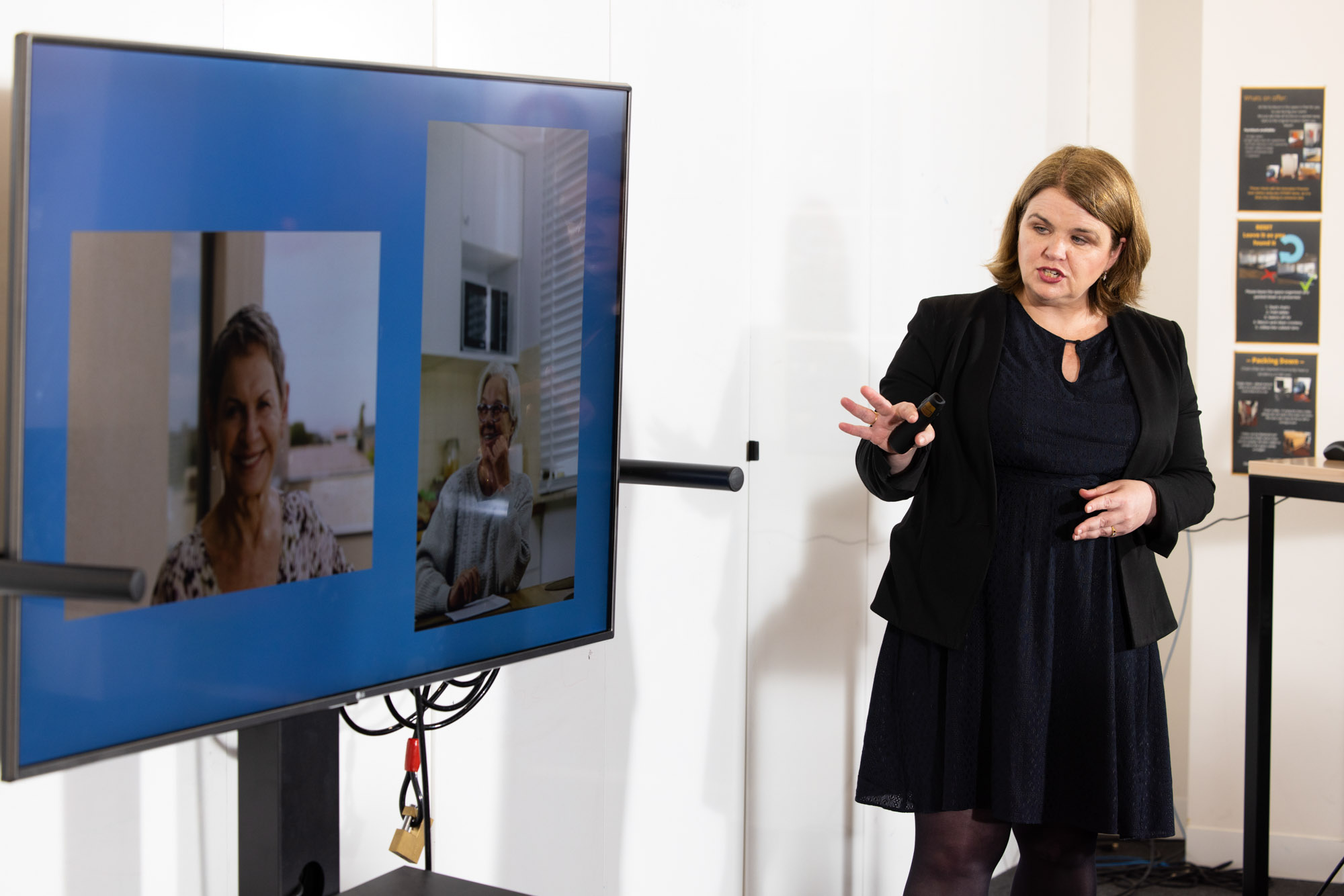Startup program unearths new talent

Jacinta Duffy, the founder of Shared Lives, presented at the 2022 Swinburne Pre-Accelerator Demo Night
In summary
- Swinburne students, staff and alumni have used their expertise to transform an idea into an impactful global business through the 2022 Pre-Accelerator Program
- Three new startups were awarded winners
- The ideas were themed around emerging technologies including optimising medication adherence, multisensory education, and shared lives solution for seniors
Many people dream of being their own boss. Some even have an idea to pursue.
For eleven early-stage founders, that goal is one step closer after they pitched their startup ideas at the 2022 Swinburne Pre-Accelerator Program Demo Night. After four weeks of workshops, guest speakers, networking and pitch coaching sessions, the participants presented to a live audience of Swinburne experts and industry contacts.
Their ideas offered solutions on how to build a healthier and more sustainable system.
Three winners put on their thinking caps to focus on health, teaching and housing for seniors.
Director of Commercial Innovation at the Swinburne Innovation Precinct, Abhay Seth says, “The program brings together experts both from industry and the university to provide insights, coaching and mentoring avenues. This helps to build robust and impactful startups.”

Dr Werner van der Merwe (left) and Professor Milé Terziovski (right) with PhD student Thu Ha Dang (middle), who presented her app to fight cancer
An app to fight cancer
People aren’t perfect; patients forget to take their medications. Thu Ha Dang, a PhD student with the Digital Health CRC, wanted to find a digital solution.
She is leading a multidisciplinary team from Swinburne and Peter MacCallum Cancer Centre to develop a mobile app, named SAMSON. The app will improve patients’ adherence to cancer treatments and reduce medication errors. This should help to reduce medication-related problems that put lives at risk.
“SAMSON aims to translate behaviour-change research knowledge and expertise into best practice oncology patient-centred care,” said Thu Ha Dang.

Claire Spring is creating products to better teach children. She is pictured with Professor Milé Terziovski (left) and Dr Werner van der Merwe (right)
Teaching through touch (and the other senses)
Another winner, Claire Spring, looked at the one-size-fits-all style of education and found it lacking. She set out to create a business built around better teaching tools.
“Being uninspired by the current educational system, I created a product to teach children their times tables using various senses available to them,” said Spring.
Her company, Zenzicubes, offers multisensory products, books and posters that can be used to teach children with a diverse nature of challenges and difficulties.
“Our products are beneficial for children with dyscalculia, auditory processing disorder and autism, or anyone else who wants to simplify the method used to teach vital knowledge.”

Dr Werner van der Merwe (left) and Professor Milé Terziovski (right) congratulate the final winner of the night, founder of Shared Lives Australia Jacinta Duffy (middle)
Unlocking housing for seniors
The final winner was Shared Lives Australia, which is breaking new ground as the first social enterprise in Australia to specialise in home share placements for seniors.
Founder Jacinta Duffy hopes the easy-to-use app will enable ageing Australians to remain in their much-loved homes longer and address some of the shortfalls of the aged care sector. It is also a way for users to widen their horizons, meet new people and create intergenerational friendships.
Accelerating the founder’s journey
The Innovation Precinct’s next experience, the Accelerator Program, is a 12-week program designed to help founders find their product-market fit and scale their ventures. Applications will open soon.
For the participants of the Pre-Accelerator Program, they walk away from a hands-on exercise in innovation and entrepreneurial thinking ready to take the next steps.
According to Thu Ha Dang, “The Swinburne Pre-Accelerator Program is an inspiring and wonderful program, very useful for people who want to progress their research ideas to start up.”
Jacinta Duffy agrees: “It helped our team develop management skills through interactions with industry experts. The calibre of the speakers and their generosity of spirit in supporting us outside of the program was greatly appreciated.”
-
Media Enquiries
Related articles
-

- Technology
- Science
- Engineering
Victorian students drive green energy transition through international hydrogen competition
Swinburne’s KIOSC, in collaboration with Horizon Educational and Gippsland Tech School, co-hosted the Hydrogen Grand Prix in Melbourne.Friday 26 July 2024 -

- Student News
- Film and television
Swinburne students curate "Wrestling with Reality" film season for ACMI's Cinema 3
Students from Swinburne's Cinema and Screen Studies program launch curated film season on ACMI’s streaming platform, Cinema 3.Tuesday 23 July 2024 -

- Technology
- Health
New MedTechVic prototypes to transform everyday lives of people with a disability
Swinburne’s MedTechVic has revealed three new prototypes designed through the joint Health-led Manufacturing Innovation Program, in partnership with the Australian Medtech Manufacturing Centre and Safer Care Victoria
Friday 19 July 2024 -

- University
Meet the Swinburne students and alumni at the Paris Olympics and Paralympics
Swinburne students and alumni are making their mark at the 2024 Olympic and Paralympic Games in Paris. Meet the six Swinburne athletes who are taking on the world.
Wednesday 17 July 2024 -

- Student News
Vygo: Support at students’ fingertips
Swinburne University of Technology students will have personalised support and peer-to-peer learning at their fingertips with the new Vygo app.
Thursday 25 July 2024

